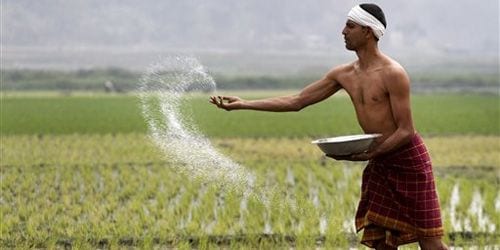
Manjusha Amberwar has wanted to be a journalist since she was in the 10th grade. And already, as a college student, she’s discovered that her local reporting might have a global scope. The story she’s working on now, she says, might “help the government resolve the farmers’ suicide issue.” That issue is increasingly urgent where Manjusha lives, in Telung Takli, in Viderbha, India. Farmers are killing themselves because they are losing their livelihoods, not to climate change or natural causes, but to corporate greed.
Maniusha believes that telling the truth might triumph over reaping profits. And as one of two primary subjects in Bitter Seeds, she reveals deeply troubling truths. Screening at Stranger Than Fiction on 16 April, with filmmaker Micha Peled on hand for a Q&A, the film is the third in his Globalization Trilogy. Just so, it considers the effects of globalization, broadly conceived and intensely focused. Manuisha provides context, and cotton farmer Ram Krishna Kopulnar shares his experience, his ongoing efforts to survive in an economy that privileges global businesses, beginning with seed engineers like Monsanto.
Genetically redesigned to resist certain pests (primarily bollworms, “cotton’s main enemy”), the Monsanto seeds have become a source of controversy in India and elsewhere, as they are nonrenewable and require specific pesticides (both expenses beyond the means of most Indian cotton farmers).
Peled’s film explores the apparent causal relationship between the seeds and a shocking increase in farmer suicides in the past 16 years (“Every 30 minutes,” the film notes, “a farmer in India kills himself”). Manjusha’s decision to pursue journalism — and specifically to pursue the story of the seeds — is inspired by her own tragedy, her father’s suicide. Even as her mother worries that she is not following a more traditional path (that is, to be married), Manjusha is determined to discover how the seeds have come to be so predominant, and how farmers appear to have so little choice. She takes careful notes as she interviews widows, farmers, and local administrators, and then, when she is given a video camera, she begins taping conversations.
Manuisha faces resistance from her family; when her mother notes, “Everybody in the family against you becoming a journalist,” she reassures her, “What people say is not right, that girls go bad with too much freedom.” Rather, Manuisha shows again and again, she means to use her own education and expanding understanding to help everyone she can. Bitter Seeds includes some of her footage, intercut with shots of Manjusha recording and writing, as well as clips of her family and Rama’s in cotton fields, doing their best to keep their crops alive. The documentary also follows Rama as he’s unable to secure (another) bank loan to buy seeds, and so must borrow from a moneylender, a decision you can imagine will lead to disaster.
Promised that the GM seeds will produce a “high yield,” the mostly illiterate farmers are now unable to purchase conventional seeds, and as their crops fail, they can’t pay back loans or begin again the next year (as Ram learns, he’s unable to secure a second loan if he has one already, even as one loan can’t begin to address the many costs of running a farm that must adhere to the new rules). While experts in offices offer competing narratives — the seeds are good and the farmers’ problems are of their own making versus the seeds exemplify the scourge of globalization — the film observes a related and ongoing predicament, namely, farmers who are increasingly unable to marry off their daughters because they have no dowries. (One of Ram’s daughters observes that girls “cause too much trouble: if I had been a boy, I could have worked.”)
Bitter Seeds points out that these multilayered crises evolved because of an illicit deal struck by the US and Monsanto with the World Trade organization “that forced India to open its doors to foreign seed companies.” Now, even as the US spends $3-4 billion each year to subsidize its own cotton famers (and pays an annual $147 million fine for doing so), farmers in other places suffer consequences.
“I’m going to make news of what I’m learning,” Manuisha asserts, “”It’s necessary to report it.” When her story appears with the headline, “When Will the Struggle Stop?” the answer seems almost unimaginable. And yet Manjusha persists, determined to make Indian farmers’ plights visible. At the same time, Bitter Seeds increases the reach of her story, and at the same time exposes how films do their work, how they create and recreate “here” in multiple elsewheres.

![Call for Papers: All Things Reconsidered [MUSIC] May-August 2024](https://www.popmatters.com/wp-content/uploads/2024/04/all-things-reconsidered-call-music-may-2024-720x380.jpg)



